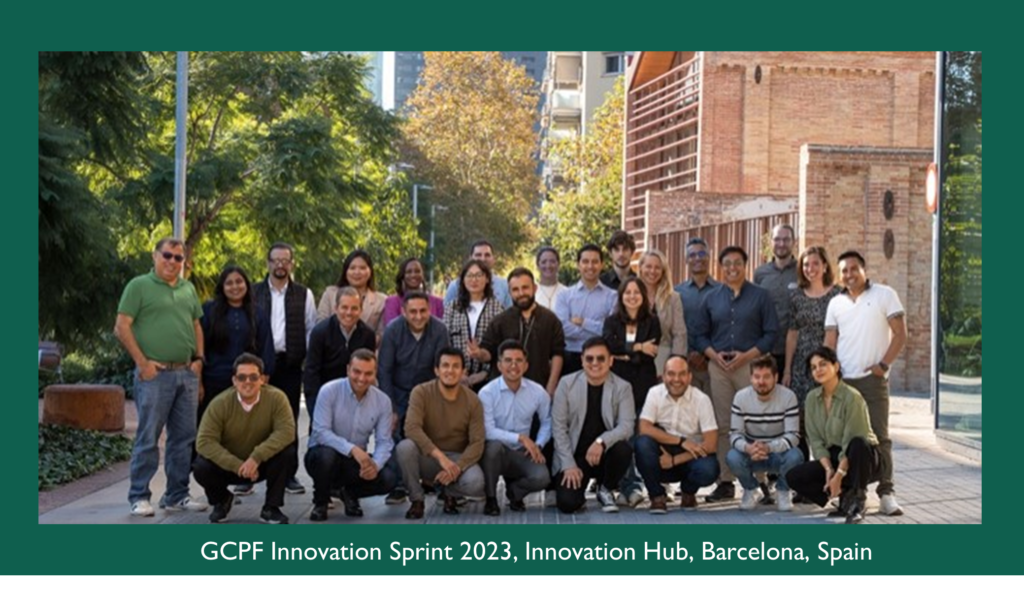From Vision to Action: Prototyping climate finance value propositions
Share
Insights from GCPF’s innovation sprint with partner financial institutions

18 participants from six partner Financial Institutions teamed up at the Innovation Hub in Barcelona to apply proven Design Thinking techniques to test their climate finance ideas. While workshops generally focus on providing guidance and solutions, this sprint was different: participants were asked to put themselves in their client’s shoes and challenge their ideas on the feasibility and desirability of their proposed climate innovations. Teams tested their assumptions and crafted game plans to guide further actions. The inevitable struggles and frustrations became catalysts, honing service and product offerings.
“Coming here we expected mostly to learn how similar challenges were addressed in other markets. Instead, we leaned into the Design Thinking methodology, deconstructing our ideas and extracting fresh insights from both experts and clients to help us reshape our offering. Joining the workshop and drilling down to our core value proposition allowed us to go from just ‘a vision’ to a solid game plan. We are dedicated to testing our idea now with smallholder farmers as we see a significant business opportunity with a great social impact potential.” – expressed Jorge from Banpro, Nicaragua.

Value of active listening: Ask, listen, and never stop documenting!

After several post-its, client calls, and repeated iterations, the institutions’ ideas found more viable footing: some turned into concrete business cases while others were thrown out the window.

“Prior to the workshop, I was really convinced of our project idea. But the workshop helped us to see different perspectives and radically rethink the intended product idea from our clients’ perspective instead. This was hard at first, but it allowed us to get rid of our preconceived notions and be open to new insights. I learned how not to oversell the idea, but rather really listen to clients and experts to improve product features. I plan to apply this method of engagement with others to generate better ideas for other projects in our Bank.” said Khan Bank representative, Suvd, from Mongolia

Unlocking team potential: Teamwork is key, so do not be afraid to diversify!
A critical factor for each teams’ progress was the diversity of the team members who brought complementary perspectives resulting in a more holistic approach. The two teams from Ecuador proved that without commitment to teamwork, testing new ideas is not possible.

Andres from Banco Pichincha, Ecuador emphasized the power of teamwork: “This dedicated time away from our desk allowed us to directly focus on the project. Banco Pichincha already works with design thinking in many parts of its business, but this was a first time with our colleagues from our sustainability area and it worked very well. The approach is powerful, and it works! The framework allowed us to test ideas and dismiss them without taking it as a personal defeat.”.
Maria Soledad from ProCredit Ecuador, shared similar sentiments “I valued the contributions from my colleagues which helped us challenge our initial concept. At some point when it felt like our initial ideas had to be forfeited, the team unified, strategized, and came up with new value propositions to test. Having a safe space for everyone to openly provide feedback was also a critical component.”

Journey of transformation: Prototype, test, repeat!
Over the course of the sprint, many coffee cups were emptied, radical pivots were made, and new insights were gained. At its conclusion, every team left with a tangible game plan in hand and a newfound motivation to apply Design Thinking methods.

Vahagn from Ameriabank, Armenia, celebrated the sprint’s perspective: “This workshop was not just a learning experience but delivered practical outcomes. We came in with a particular idea and left with a more refined one that will meet our business objectives. The approach was very inspiring, and we want to replicate it also for other initiatives we manage.”
Levan from TBC Bank, Georgia had this to say: “The unique set-up of the workshop allowed us to zoom in and better understand what are the key factors that would make our idea a better “product market” fit. I personally also really appreciated the positive energy of all the participants.”

Sara and Rio, the two innovation experts contracted by GCPF’s Technical Assistance Facility to lead the sprint, were proud to play a role in the Fund’s first “innovation sprint” of its kind. “The process was also a prototype for the Fund, and our job as experts was to equip the teams with the right tools and techniques that can be useful post sprint. Often the partner institutions are trying to find the right balance between day-to-day business and exploration, and we recognize that there is not always space for innovation. However, we encouraged them to ‘stay curious’ as it will be the only way for them to survive in an increasingly competitive environment. We are happy to share in this journey with the partners and are curious to see how all the climate finance ideas come to life!”



